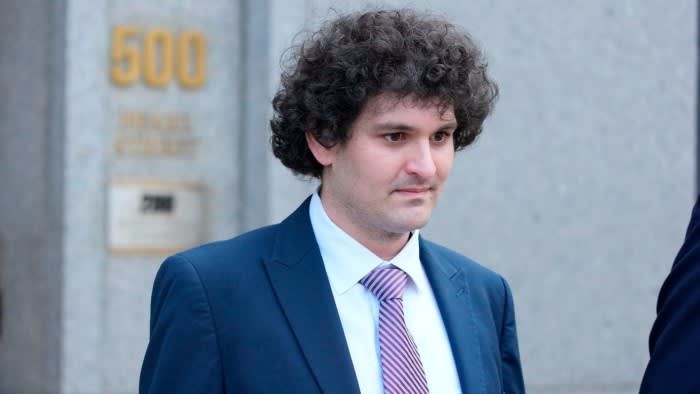FTX founder Sam Bankman-Fried sentenced to 25 years in prison for fraud

Get free access to the Editor's Digest
Every week, Roula Khalaf - the chief editor of the financial times (FT) - chooses the news stories that are most important to her and shares them in her newsletter.
Sam Bankman-Fried received a punishment of 25 years behind bars for his involvement in the downfall of his FTX digital currency exchange. A judge in the United States determined that Bankman-Fried had caused immense damage by taking billions of dollars from clients to make high-risk wagers.
This statement sets a record for one of the lengthiest sentences ever given to a white-collar criminal in the United States. The ruling marks the end of a rapid and eventful decline for someone who used to be a significant influencer in the crypto industry, sought after by both famous individuals and political leaders.
During the hearing at a federal court in Manhattan on Thursday, Judge Lewis Kaplan stated that the 32-year-old individual, who was convicted on seven charges of fraud and money laundering in the previous year, was aware that his deeds were illegal and criminal. The judge also mentioned that Bankman-Fried exhibited no real repentance for his actions.
According to Kaplan, Bankman-Fried is feeling remorse for his foolish gamble on the possibility of getting caught, but he refuses to confess. The judge also determined that Bankman-Fried attempted to interfere with a witness and provided false information during his testimony in court.
Bankman-Fried appeared unhappy and was dressed in a uniform characteristic of prisoners which was tan in color. He expressed remorse while speaking to the court just before the sentence was announced. He acknowledged his wrong decisions and took responsibility for FTX, admitting that its failure was due to his actions.
He argued that the decisions made did not necessarily cause harm, as FTX had sufficient assets to reimburse all its customers at present prices. He stated that the company only experienced a temporary lack of liquidity.
Bankman-Fried, recognized for his curly hair and preference for cargo shorts, used to be a distinguished figure in the crypto world. He appeared as a reputable leader in an industry often chaotic and unregulated. He also made large donations to political figures across the US spectrum, which Kaplan affirmed was an effort to gain "power and influence." However, FTX collapsed in November 2022 and filed for bankruptcy soon after. Eventually, Bankman-Fried was found guilty by a jury in New York in the following year.
According to Damian Williams, the United States attorney for the southern district of New York, who was responsible for bringing the case forward, the actions of Bankman-Fried amounted to one of the biggest financial scams of all time. They managed to steal more than $8 billion from their customers, displaying a bold disregard for their clients' wishes and breaking the law without hesitation.
He stated that the verdict would "make sure the accused can no longer carry out deceitful activities and is a significant warning to anyone who may be enticed to participate in monetary offenses."
The legal representatives of the ex-crypto leader requested a penalty that did not surpass six and a half years. They stated that the bankruptcy proceedings could reimburse FTX consumers.
Marc Mukasey characterized his client as a socially awkward individual with a strong affinity for mathematics who has no intention of causing harm. He argued that the government's comparison of Bankman-Fried's wrongdoing to the malicious and cruel acts committed by Bernard Madoff, who admitted to orchestrating the largest Ponzi scheme in American history, is completely misguided.
According to Mukasey, Sam was not a heartless financial criminal who went away with billions of dollars stashed away in a Swiss bank.
The prosecutors wanted to give Bankman-Fried a sentence of 50 years because they believed he would commit another crime if released earlier.
The prosecutor, Nicolas Roos, stated to the judge that it was not just a matter of liquidity crisis, but the act of stealing billions of dollars from customers worldwide. He also mentioned that Bankman-Fried's writing showed his plan to launch a similar business to FTX. Kaplan, the judge, later concurred that there was a substantial risk of Bankman-Fried committing the same offense again.
During the hearing on Thursday, a major point of concern was determining the financial impact of Bankman-Fried's illegal actions on FTX's investors and clients. At the beginning of the hearing, Kaplan dismissed Bankman-Fried's claim that there was no loss resulting from his crimes. This was despite assurances from FTX's bankruptcy trustees that customers with valid claims against the exchange would eventually receive full payment.
According to the judge, the statement made by the defendant that FTX clients and debtors would receive full payments is not accurate. The judge deemed the statement not logically sound and based on mere conjecture.
According to Kaplan's estimations, FTX investors suffered a loss of $1.7 billion, lenders were down by $1 billion and customers lost a whopping $8 billion.
The attorneys of Bankman-Fried announced their intentions of appealing the decision and the penalty, which consisted of a demand to surrender $11 billion.
Bankman-Fried's closest associates, such as Nishad Singh, who formerly served as the leader of engineering at FTX, and Caroline Ellison, the manager of a related trading company called Alameda Research, had previously admitted their guilt and gave testimony against their ex-boss during the trial. However, they are still waiting for their sentencing.



























































